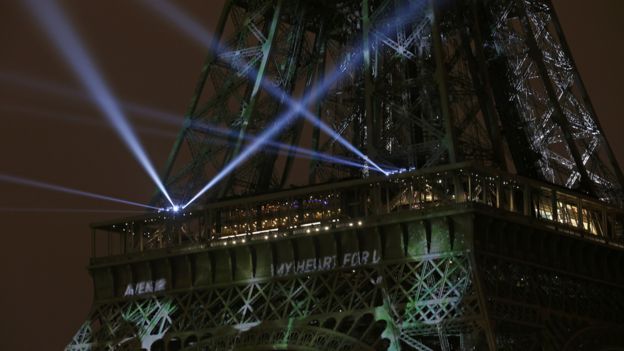US President Barack Obama has said the UN climate conference in Paris could be a “turning point” in global efforts to limit future temperature rises.
Negotiators from 195 countries will try to reach a deal within two weeks aimed at reducing global carbon emissions and limiting global warming to 2C (3.6F).
Leaders from 147 nations are addressing the meeting, known as COP21.
President Obama urged negotiators to deliver a meaningful deal, because the “next generation is watching”.
COP21: Latest updates from Paris
He told delegates: “Climate change could define the contours of this century more than any other (challenge).
“I came here personally to say the United States not only recognises the problem but is committed to do something about it.”
He added that recent years had shown that the global economy had grown while emissions had remained flat, breaking the old arguments for inaction “that economic growth and environmental protection were in conflict”.

The Eiffel Tower was lit up on Sunday evening in support of the climate conference
Russian President Vladimir Putin also addressed the conference.
During negotiations for the preceding Kyoto Protocol, Russia was the last industrialised nation to ratify the global agreement, allowing the landmark deal to come into force in 2001.
Echoing President Obama, Mr Putin said: “We have demonstrated we can ensure economic development and take care of our environment at the same time.”
In a diplomatic play on semantics, probably to highlight the differing points of view between industrialised and emerging economies, Chinese President Xi Jinping told the conference he did not see the Paris talks as a turning point nor a “finish line, but a new starting point”.
He said that climate change went beyond national borders and that it was “a shared mission for all mankind”, before reiterating China’s pledge to start cutting its emissions from a peak in 2030.
Key issues
Major points of contention include:
- Limits: The UN has endorsed a goal of limiting global warming to no more than 2C over pre-industrial levels by the end of the century. But more than 100 poorer countries and low-lying, small-island states are calling for a tougher goal of 1.5C.
- Fairness: Developing nations say industrialised countries should do more to cut emissions, having polluted for much longer. But rich countries insist that the burden must be shared to reach the 2C target.
- Money: One of the few firm decisions from the 2009 UN climate conference in Copenhagen was a pledge from rich economies to provide $100 billion (93 billion euros) a year in financial support for poor countries from 2020 to develop technology and build infrastructure to cut emissions. Where that money will come from and how it will be distributed has yet to be agreed.
Much of the discussion in Paris is expected to centre on an agreement to limit global warming to 2C (3.6F).
However, assessments of the more than 180 national climate action plans submitted by countries to the summit suggest that if they are implemented, the world will see a rise of nearer to 3C.
Peruvian Environment Minister Manuel Pulgar Vidal, who declared the Paris meeting open, said strong action on carbon emissions was essential for multiple reasons.
Mr Vidal, who hosted last year’s UN climate conference in Lima, said a deal would show the world that countries can work together to fight global warming as well as terrorism.
Christiana Figueres, the head of the UN’s climate change negotiations, also addressed delegates, saying never before had a responsibility so great been in the hands of so few.
“The world is looking to you,” she said. “The world is counting on you.”
The talks are taking place amid tight security, two weeks after attacks in Paris claimed by the so-called Islamic State (IS) group.
World leaders are attending the start of the two-week meeting to give impetus to the talks, after the high-profile failure of the Copenhagen summit in 2009.
UN climate conference 30 Nov – 11 Dec 2015

COP 21 – the 21st session of the Conference of the Parties – will see more than 190 nations gather in Paris to discuss a possible new global agreement on climate change, aimed at reducing greenhouse gas emissions to avoid the threat of dangerous warming due to human activities.
COP21 live: The latest updates from Paris
Explained: What is climate change?
In video: Why does the Paris conference matter?
Analysis: From BBC environment correspondent Matt McGrath
More: BBC News special report
What is COP21?
The 21st Conference of the Parties – or COP 21 – is a meeting of 195 countries in Paris hosted by the UN, aimed at agreeing an action plan to reduce carbon emissions. It has been been billed as the last chance to limit further temperature changes.
What are the specific goals?
The ultimate aim is to limit warming to 2C (3.6F) above pre-industrial levels, widely seen as a dangerous threshold. Since 1880, the average global temperature has already risen by almost 1C. About 0.6C of this has occurred in the past three decades.
Why does this matter?
When the Earth warms about 2°C above pre-industrial times, scientists say there will be dangerous and unpredictable impacts on our climate system. And we’re already half-way to that danger point.
BBC
 Q FM Africa's Modern Radio
Q FM Africa's Modern Radio